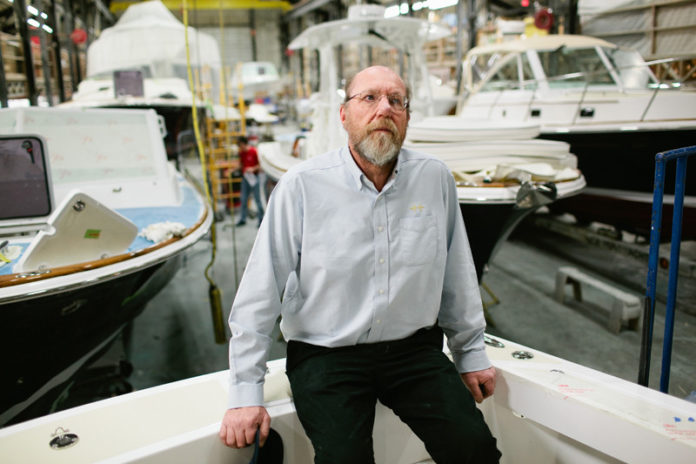
When Peter VanLancker, president of Hunt Yachts, joined the company two years after its inception, in 2000, he saw a solid business idea but a fledging execution for a boat-building business.
Thirteen years later, the company formed out of C. Raymond Hunt Associates, the well-known, former Boston-based design firm, is thriving thanks to its debt-free business model and product line that enabled it to move to Rhode Island seven years ago and weather the state’s tepid economic waters.
“It was remarkable that at first we able to survive some of these downturns,” VanLancker said. “Most boat companies don’t survive at all. They go in and out of business.”
John Deknatel in 1961 founded C. Raymond Hunt Associates with Ray Hunt, who in the 1950s developed the deep-V hull design, which many in the industry consider revolutionary for fast-powerboats design.
Winn Willard, vice president of C. Raymond Hunt Associates, joined in 1970 and worked alongside the pair until Hunt died, at age 70, in 1978. By the end of the 1990s, according to the company’s website, Deknatel and Willard decided to develop a single-engine powerboat but were unable to secure the backing of a production builder. Instead, they formed Hunt Yachts.
“[Ray Hunt] was a bit of a genius [but] wasn’t able to protect the patent. The whole industry changed on that form,” VanLancker said. “The Hunt Yachts brand came out of that history and experience [but] they had a reputation for design, not boat building. The key was taking the history that was there and moving into product. That’s where I came in.”
VanLancker had many years of experience in the industry and was, in the late ’90s, working for Boston Whaler in Florida, helping the company work to shut down its Boston plant.
The Rhode Island School of Design graduate was planning to return to New England to be closer to his wife’s family and saw, he said, an opportunity to take Deknatel and Willard’s boat-building concept into an actual business.
VanLancker had previously worked with Deknatel and Willard, having hired them as architects throughout his career.
He said things got off to a good start. Hunt Yachts added models to the original Hunt 33 and developed Surfhunter and Harrier coast-cruiser and day-cruiser lines and experienced continuous growth.
Six years into his joining the company they outgrew their original Massachusetts facilities and sought a larger space, moving into the Melville Marine Complex in Portsmouth.
With the move, Hunt Yachts was able to establish its Hunt Marine Services (in-house repairs) business.
“It built another … profit center and it also allowed us to offer more of a full-service package to the experience with a Hunt yacht,” VanLancker said. “We could build, store, service, and broker, and service and sell [a boat] again. There are some boats we’ve built and sold two or three times over.”
When the recession hit in 2008, VanLancker said, the company was able to navigate through it by keeping to their “small but powerful” model.
They even were able to secure customer backing to collectively design and tool new express sedan models.
“We didn’t bear the burden of having to shrink everything down. We were able to enter and gain [new] market share,” VanLancker said. A lot of that, he said, was putting in procedures and processes to guarantee there was accountability within the company to each other.
Coupled with, he said, having at its core a “really good product,” the model has worked.
Today, the company advertises 18 boat models on its website.
The most recent additions are in the 42- to 68-foot boats and Hunt Yachts is focused on sales marketing efforts for those models, retailing between $1.5 million and $2 million.
“We’re just beginning to crack that market. It takes time when you’re the new guy. People are looking more closely at reputation, finish and things like that,” VanLancker said. “We’re becoming more and more a player in that. This industry is one where there aren’t a lot of new people entering the market. It’s very competitive and people have passion for what they do.” •COMPANY PROFILE
Hunt Yachts
Owners: Peter VanLancker, John Deknatel and Winn Willard
Type of Business: Luxury yacht design, construction, service and sales
Location: 1909 Alden Landing, Portsmouth
Employees: 51
Year Established: 1998
Annual Sales: WND











